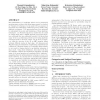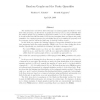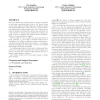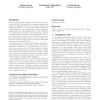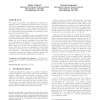127
click to vote
STOC
2009
ACM
16 years 1 months ago
2009
ACM
We study a general sub-class of concave games, which we call socially concave games. We show that if each player follows any no-external regret minimization procedure then the dyn...
112
click to vote
STOC
2009
ACM
16 years 1 months ago
2009
ACM
We study the topological simplification of graphs via random embeddings, leading ultimately to a reduction of the Gupta-Newman-Rabinovich-Sinclair (GNRS) L1 embedding conjecture t...
STOC
2009
ACM
16 years 1 months ago
2009
ACM
Non-relativization of complexity issues can be interpreted as giving some evidence that these issues cannot be resolved by "black-box" techniques. In the early 1990'...
STOC
2009
ACM
16 years 1 months ago
2009
ACM
The classical zero-one law for first-order logic on random graphs says that for every first-order property in the theory of graphs and every p (0, 1), the probability that the r...
102
click to vote
STOC
2009
ACM
16 years 1 months ago
2009
ACM
We prove lower bounds on the redundancy necessary to represent a set S of objects using a number of bits close to the information-theoretic minimum log2 |S|, while answering vario...
STOC
2009
ACM
16 years 1 months ago
2009
ACM
We prove that for any positive integer k, there is a constant ck such that a randomly selected set of cknk log n Boolean vectors with high probability supports a balanced k-wise i...
125
click to vote
STOC
2009
ACM
16 years 1 months ago
2009
ACM
Linear programming decoding for low-density parity check codes (and related domains such as compressed sensing) has received increased attention over recent years because of its p...
100
click to vote
STOC
2009
ACM
16 years 1 months ago
2009
ACM
We consider and analyze a new algorithm for balancing indivisible loads on a distributed network with n processors. The aim is minimizing the discrepancy between the maximum and m...
100
click to vote
STOC
2009
ACM
16 years 1 months ago
2009
ACM
Algebraic codes that achieve list decoding capacity were recently constructed by a careful "folding" of the Reed-Solomon code. The "low-degree" nature of this f...

